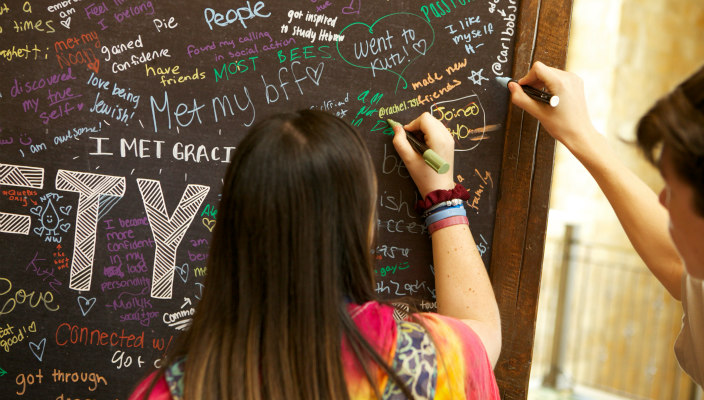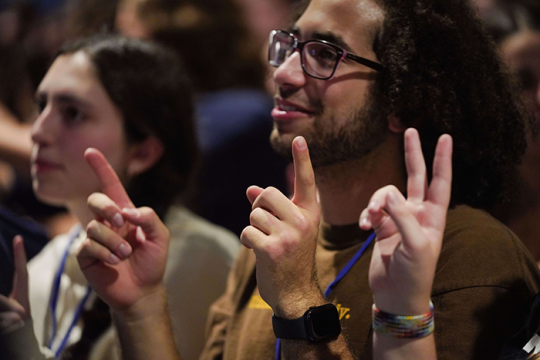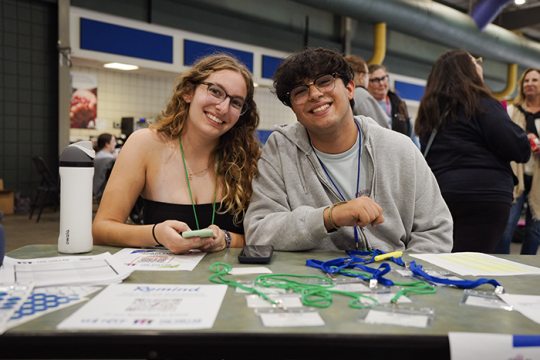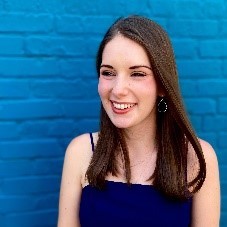
Almost exactly six years ago, I ran for NFTY-TOR regional president. I lost. And yet when I look back at my election materials in a bout of nostalgia, I stand by absolutely everything I said, now having seen how much the ideas I mentioned still influence me and the way I think about leadership, both personally and as an organizer working with NFTY and Reform Jewish teen leadership.
In my speech, I talked about my favorite TED Talk, "Everyday Leadership" by Drew Dudley.
I could spend all day analyzing the talk, but I think it is best summarized by this line:
"We've made leadership about changing the world, and there is no world. There's only [seven] billion understandings of it. And if you change one person's understanding of it, understanding of what they're capable of, understanding of how much people care about them, understanding of how powerful an agent for change they can be in this world, you've changed the whole thing."
That idea resonated with me so much as a sixteen-year-old.
It pushed up against so much of what I thought I knew about leadership: that leaders were only the people with titles, standing in front of the room, leading programs.
It made me feel so full to think of leadership as something personal, powerful, and intentional- to think about leadership as something valuable.
When we limit our understanding of leadership, as Dudley teaches, "We take moments where we truly are a leader and we don't let ourselves take credit for it or feel good about it." We devalue the fact that everyone with strong, passionate, significant ideas can make an incredible difference to someone else. We devalue the experience of everyday leadership.
Sixteen-year-old me held onto the concept of everyday leadership with an unbelievable amount of comfort and confidence because I was a product of leaders whose power was in their relationship-building. That comfort and confidence in everyday leadership is why I find comfort and confidence in the framework of community organizing and why I was willing to dive headfirst into the complete unknown when asked to work with NFTY.
Bringing community organizing into NFTY came from a need to build trust and relationships with those in our community in order to identify our leaders and set them up to take action on the things that are important to them, rather than to take feedback or data back to a higher up.
We have started our organizing with these three steps:
- Building trust and relationships: My work began with a charge of 100 one-to-one conversations with teens, alumni, and Jewish professionals. We talk about their experiences in the Reform movement, what fills them up, and what wears them out. They share what makes them nervous, stressed, or distrustful. They often reach out to talk more, and at least those who do feel heard, seen, and respected. They are not having transactional conversations; they are building relationships.
- Identifying leaders: It is from those relationships that I have been able to start identifying leaders. They are a mix of teens, alumni, and Jewish professionals from all over the country. They all have something very personal at stake. And they all care incredibly deeply about teen leadership development in the Reform movement.
- Setting them up to take action for themselves: One fundamental community organizing rule is not to do for others what they can do for themselves. Rather than I, as a staff member, taking their pulse and bringing that information back to those higher ups, we are instead bringing these leaders in to share their voices and visions, and to actualize their own power. We are not holding focus groups and bringing back data. We are organizing people to share their own views and have power over their own movement.
It can feel so different than anything we've done as a collective before. It can feel slow or inefficient because we aren't used to dealing with change on such a large-scale, interpersonal level. It is a different kind of leadership that may feel like such a gamble. And it has immense and intense power of which we are just now scratching the surface.
We are building relationships. We are identifying leaders who will now go on to identify leaders. We value the fact that we have strong, passionate, significant ideas that can make an incredible difference to someone else. And because of that, we can take action to make change happen for ourselves. Learn more about the work we are doing and join us at virtual house meetings to be a part of the movement!
Related Posts

Wisdom Across Generations: Leading for Tomorrow

Leadership Boot Camp: A Clean Page, Infinite Possibilities

